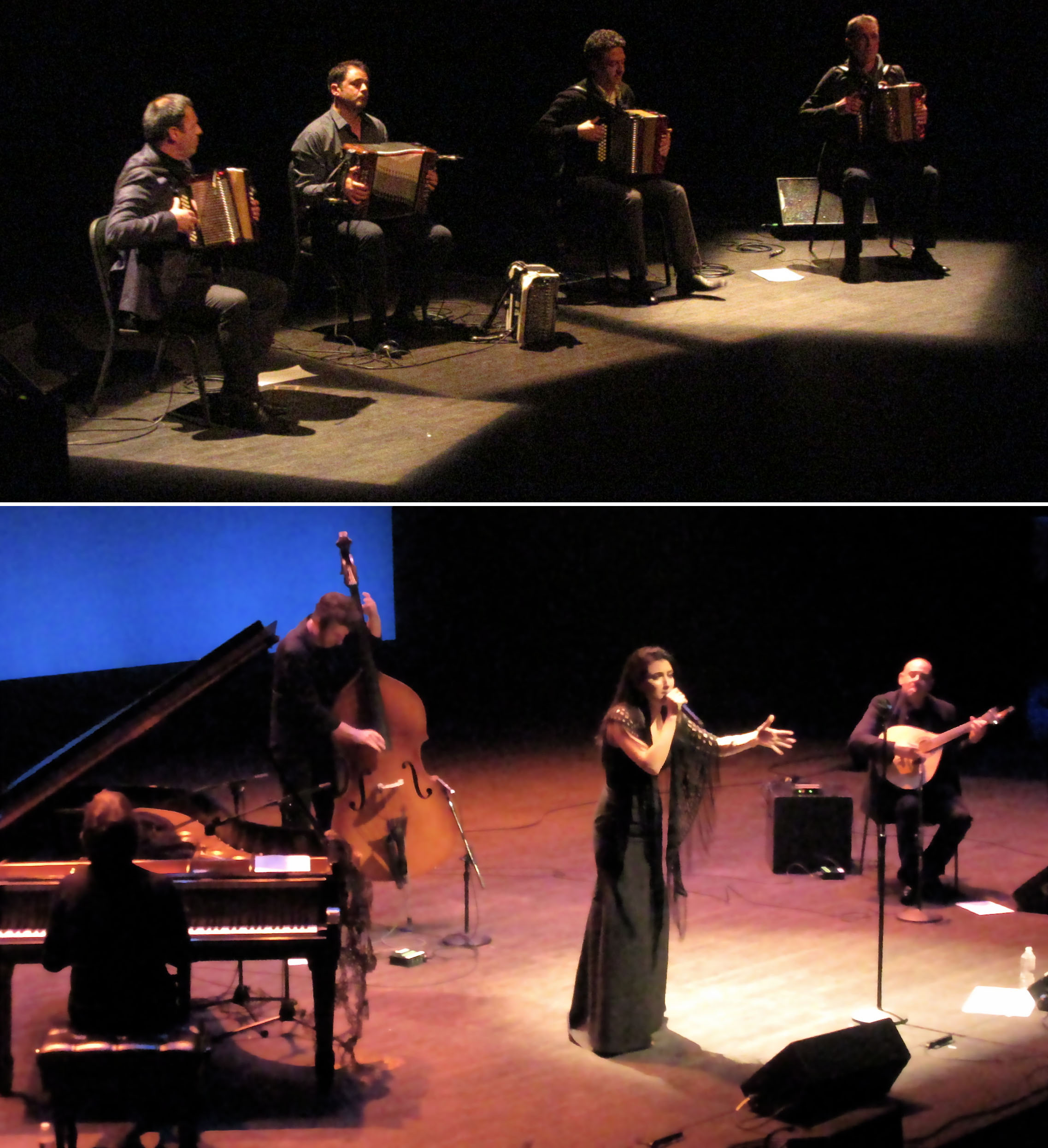I made my way to Newark on Saturday to hear Nathalie Pires sing fado and on the way encountered a quartet of diatonic accordionists called Danças Ocultas. Artur Fernandes, Filipe Cal, Filipe Ricardo, and Francisco Miguel, who formed the group in 1989, were the first half of the program at the New Jersey Performing Arts Center, part of the city’s annual Portuguese celebration, and their sound was new to my ear. Their instrument, called a concertina in Portuguese, is somewhere between the keyboard accordion and a bandoneón, with buttons rather than keys and a long but finely articulated bellows. The quartet’s explicit mission is to move it beyond folk and the jauntily popular to the “hidden dances” within.
Accordions have always held in their nature the creepily uncanny; they go well, for some reason, with clowns, monkey trainers, mimes and charlatans. Danças Ocultas pushes through those strata to a region still unsettling but more mysterious, long vibrations, great gasps, the pant of bellows expanded and contracted with no work on the buttons. The austerity of the sound contrasts with the brightly colored patterns that decorate the articulations; it is both modernist and atavistic. It sounds a little like “space music” (certainly Danças Ocultas could score a sci-fi film), but is more grounded than that: there is an implied dance in the beat, an impetus toward movement, something earthbound, and physical.
Nathalie Pires came on after an intermission, during which the haunting effects of the quartet spread out and hung in the air. She is a Portuguese-American from Perth Amboy and has made herself an international career, dividing her time between the New York area and Lisbon, and touring both the U.S. and Europe. There is something in her fado that varies a little from what I have heard in Portugal, or from Portuguese singers here. It seems to me to be differently motivated. There is an emphasis in her style on the virtues of achievement, on the hitting of notes and the assertion through them of familial roots and a mixed national identity. There is less plumbing of the seabed of emotion; loss, in her fado, seems, somehow, to be revocable, and perhaps avoidable in the first place. The achievement of the song (many of those she sings are not traditional but written for her) is, in a way, proof of that, of the very American proposition that it is the future that matters, not the saudade of the past. That she makes greater use of the piano than other fadistas I have heard and seen is part of this as well; it is, in comparison with the Portuguese guitar, a hopeful instrument, less tied to memory and the pull of tradition.
Be that as it may, her performance was impressive. She has a physique that commands the stage, and she has recognizably mastered the gestural and postural vocabulary of the form. The set had a strong communal feel, with its share of hometown shout-outs, and a superb set of musicians (Ricardo J. Dias, piano; Bernardo Moreira, bass; and Custodio Castelo, a distinguished player of Portuguese guitar). It was near the end that Pires did the thing I like the best about her, which is that she sings, whenever possible in her concerts, one song without a microphone. She is stunning in this mode. I have heard her in the past fill the vault of a cathedral, or modulate herself perfectly to the intimacy of a tavern. The Victoria Theater at NJPAC is a good-sized house, but she filled it with ease, without crack or blemish of voice. For certain kinds of songs, at least, the microphone doesn’t really suit her, especially at their climaxes. I doubt I was the only one who wondered, hearing her unamplified, if she couldn’t have dispensed with it sooner. It was without it that the aesthetic of achievement was at its most moving and artistically potent.
Click on Nathalie Pires and Danças Ocultas for more on each. Go to NJPAC for information on programs and events at that venue.
